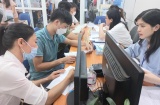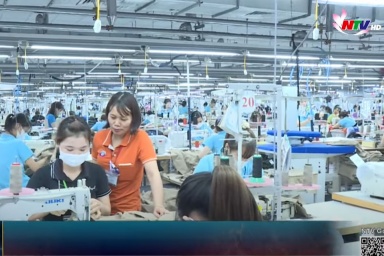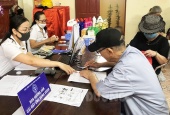HRDWG Workshop - “Digital age: The world of work and labour market information”
(LĐXH) In the framework of The second APEC Senior Officials Meeting (SOM 2) and related meetings, Human resource development working group established workshop “Digital age: The world of work and labour market information” in May 11th. The workshop attracted the participation of representatives from APEC’s member economies, research institutes, universities and international organizations...
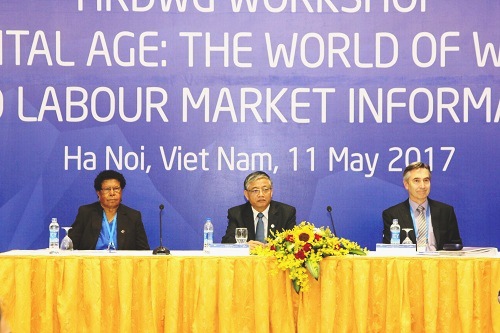
The delegates who chaired the workshop
On the opening remark, the representative of host country - Vietnam, Mr. Doan Mau Diep, the Deputy Minister of Labour - Invalids and Social Affairs emphasized that in the 21st century, the world has witnessed a leap in information technology, the explosion of internet, automation, development based on knowledge and artificial intelligence. The world economic outlook will change dramatically in the coming decades due to the impact of the 4th Industrial Revolution. Globalization and technological revolution are increasing challenges with the APEC economies in general and Vietnam in particular, therefore, we should should strive with welfare policies, training and redirecting for a part of labor lost due to the application of new technologies.
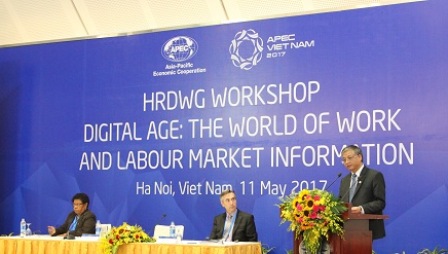
Deputy Minister Doan Mau Diep on his opening remark
With the theme of APEC 2017 as "Creating new momentum and working together to build the common future," the APEC and Asia-Pacific region has demonstrated common denominator, long-term goals of building a peaceful , stable and integrating community in the region. Vietnam, as well as APEC ‘s member economies, hopes to accelerate economic growth, which is really necessary for the Asia-Pacific region. Recognizing the opportunities and challenges of the digital era globally, the HRD Working Group is developing a draft document on human resource development in the digital age. This initiative aims to strengthen regional cooperation in human resource development to address the challenges of the digital age; focus on priority actions in three areas including Labor market development, Skills education and vocational training, Social Security.
In Vietnam, it was projected that by 2025, the workforce will increase by an average of 1.28% per annum, with an increase in labor size from 55.5 million (2016) to 62 million (2025). The shift in labor structure has been identified as the main direction to increase labor productivity. However, the structure of trained labor has not matched the actual demand and unbalance between training disciplines. By 2016, Vietnam had only over 11.21 million / 54.36 million trained workers (20.6%). According to a study published by the ILO, in the next two decades, about 56% of workers in five Southeast Asian countries, including Vietnam, are at risk of losing jobs due to robots, especially in the garment industry. If the labour is not trained with skills, they will be at risk of unemployment because of robots. ILO research indicated that textile and footwear were currently the most labor-intensive sectors in countries such as Indonesia, Vietnam and Cambodia, in which 86% of Vietnam's garment workers, 64% of Indonesia and 88% of Cambodian workers may lose their job of automation trend.
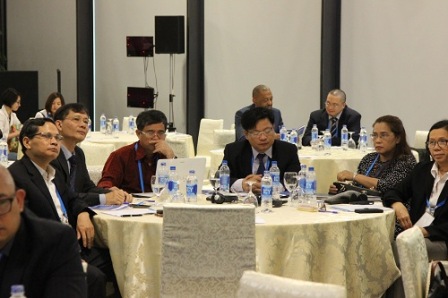
The workshop attracted the participation of representatives from APEC’s member economies,
research institutes, universities and international organizations...
In the discussion, representatives of APEC member economies reiterated that a country's technological renovation process depended on two main factors: the capacity of domestic enterprises to invest in innovation, technology and national capabilities to take advantage of spillover effects of foreign investment. To achieve this, in addition to industrial and technology policy, investment in human resources plays a very important role, as the spillover effect of FDI is mainly achieved through linking production with domestic enterprises and through labor training. Technological advances by robots, computers and digitized; Globalization, production and increasingly specialized work; Employment relationships and the increase of vulnerable employment, the gender gap in the labor market; The increase in informal and vulnerable employment will be challenges for countries in the region to ensure decent work.
With the aim of enhancing regional cooperation in human resource development to cope with the challenges of the digital age, focus on priority actions in the development of labor market systems, education, vocational training and social security, representatives of APEC economies will share practical experiences and discuss further about the challenges and benefit brought by digital age in human resource development ,as well as implications of this tendency for the labor market and requirements of stakeholders such as government, employers and workers. The workshop will contribute to the strengthening of the recommendations as well as the input to the “High-level Policy Dialogue on Human resource development in the digital age” that will be held on 15 May 2017.
Doanh - Ngoc
Translated into English by Minh Ngoc





